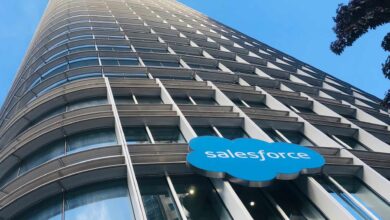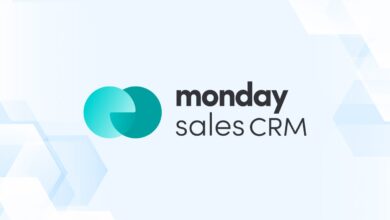Best CRM software 2024 | CNN Underscored Money

Managing a customer-facing business without customer relationship management (CRM) software is like managing a business blindfolded — with no clear view of the customer or sales funnel, let alone potential growth opportunities. Dynamic and multifaceted, CRM software is designed to help businesses maximize customer journeys and experiences and boost sales while doing so.
With an abundance of CRM software on the market, finding one that squares perfectly with your business needs can feel like an enormous task, which is why we’ve created this list of the best CRM software for small businesses to save you the hassle.
Starting paid plan price
$10 per user per month (billed annually with a minimum of 3 users)
Ease of use (based on user reviews)
Excellent
Starting paid plan price
$18 per month
Ease of use (based on user reviews)
Above average
Methodology
To help small and medium-sized businesses (SMBs) choose the best CRM software, we evaluated 24 top tools and 65 distinct plan options using more than 2,600 data points to develop a ranked list. We assessed each CRM tool’s core set of features, pricing and value for money, additional features and service and support offerings. We then assigned our Editors’ Score to the top 10 options from our ranked list. Read our full methodology here.
Apptivo
Best CRM for small businesses

Why we picked it
With affordable pricing plans and a comprehensive and customizable all-in-one platform, Apptivo is our top-rated CRM for small businesses. Combining lead and contact management and quoting and invoicing into one integrated platform, Apptivo provides a centralized solution for managing customers, contacts and prospects.
Lorem ipsum
Apptivo’s core apps are customizable without code using a drag-and-drop editor that lets you tailor fields, reports, dashboards, views and layouts according to your business needs. While campaign management and marketing automation features aren’t included in the tool’s Lite plan, the higher pricing tiers have access to strong functionality that includes an email template builder, performance dashboards and audience retargeting.
Lorem ipsum
Following a 30-day free trial, you can choose from three progressive pricing tiers, each with a great range of CRM features. Pricing, when paid annually, starts at $8 per user for the Lite plan, increasing to $12 per user for the Premium plan and capping at $20 per user for the Ultimate plan. If you opt for month-to-month payments, prices will increase by 20%. Plus, Apptivo’s suite of applications allows businesses to start small and seamlessly add more functionality as they grow.
Lorem ipsum
Apptivo also provides 24/7 support and implementation assistance with every pricing tier, and its mobile app — with all the same features as the web app — enables teams to access and sync all data and gain a 360-degree view of customers and prospects in the field.
Pros
- 24/7 customer support via phone, email and chat
- Intuitive and modern interface
- 30-day free trial and one-on-one demo session
Cons
- No marketing automation feature included in Lite plan
- No campaign management feature included in Lite plan
- Limited third-party integrations compared to other providers
Who should use it
Small businesses across all industries with plans to scale can benefit from Apptivo’s customizable and flexible CRM solution. Apptivo’s app offerings also position it as a great choice for businesses seeking to integrate their CRM with supply chain, HR and project management processes.
Why we picked it
Going beyond basic social media monitoring, Nimble CRM has social media prospecting functionality baked into the platform’s core feature set. Along with social profile matching (which automatically updates relevant contact data from social media profiles to their records), Nimble’s segmentation tool identifies and groups audiences based on criteria like location and shared relationships. This enables targeted actions such as setting stay-in-touch reminders or sending group messages.
Lorem ipsum
Nimble’s social data enrichment tool further enhances your contacts’ social media data and creates a workflow once contact information is located. This involves sending messages, gauging their effectiveness and scheduling follow-ups. Nimble also enables users to customize multiple pipelines, automate marketing activities and engage in lead generation.
Lorem ipsum
In terms of pricing, Nimble’s single-tier pricing comes in at $24.90 per user per month (increasing to $29.90 if you choose to pay on a month-to-month basis), which might limit your ability to scale in terms of core features. However, you can add 10,000 contacts, storage in increments of 10GB and credits for data enrichment, each for an additional $10 per month, and, given the platform’s broad functionality, Nimble is still a strong option for growing businesses without compromising on essential features.
Pros
- Strong social media integrations
- Kanban board workflows with drag-and-drop editor
- 14-day free trial
Cons
- No dedicated customer support phone number
- Single-tier pricing could constrain future scalability options
- Storage limit of 2GB per seat
Who should use it
Nimble is well-suited for businesses that rely on social media for engaging with customers and those that want to enhance their use of social media for prospecting, outreach and gaining insights into interactions. However, if you plan on scaling your CRM feature set in the future, Nimble might not be the best choice due to its single-tier pricing.
HubSpot

Why we picked it
HubSpot’s free CRM is a great starter tool for small businesses that need a basic, easy-to-use CRM with strong core features. These include email scheduling, tracking and templates, a prospecting tool, contact and document management, and reporting dashboards. The free tool provides great functionality — in fact, the paid plans provide the same core features, just with extra bandwidth for features like email sends, templates, contact lists and deal pipelines.
Lorem ipsum
As well as being a great first-time CRM, HubSpot scales as businesses grow. The Starter plan — priced at $18 per month for two users with annual payment or $20 on a month-to-month basis — and the Professional plan — priced at $450 per month for five ($500 month-to-month) — offer extra functionality including conversation routing, recurring tasks and forecasting. This is great if you need advanced features, but the free plan will cover your basic CRM needs and more.
Lorem ipsum
Another benefit for CRM novices is the combination of easy implementation processes and great customer support reported by users.
Pros
- Comprehensive free plan
- Scalable pricing plans
- Easy setup process
Cons
- Cheapest paid plan comes with limited workflow functionality
- Extra contacts and users can become costly
- Sales analytics feature only available with the most expensive plan
Who should use it
Small businesses looking for their first CRM solution on a budget will appreciate HubSpot’s comprehensive, free-forever CRM. It comes with a solid knowledge base, training resources and an active user community to support setup and help businesses leverage the platform’s extensive feature set.
monday.com
Best for team collaboration

Why we picked it
If you need a highly collaborative CRM tool for cross-functional teams, monday.com’s Sales CRM platform could help you simplify shared ownership of tasks through custom workflows, centralized communication and real-time collaboration.
Lorem ipsum
monday.com’s CRM tool is for you if you prefer a project management style approach to managing the sales process, with several visual board styles including Kanban, timeline, workload and calendar views. You can also tailor your CRM according to your sales and work processes, including options to customize lead scores, labels and dashboards.
Lorem ipsum
Each plan comes with unlimited board creation, as well as unlimited customizable pipelines and templates for lead, contact and deal management. What’s more, every monday.com pricing plan lets you build an unlimited database of contacts, which means you won’t need to factor paying for extra storage into your budget as your contact list expands.
Lorem ipsum
You can easily add extra functionality at a reasonable price as you grow, with three pricing tiers ranging from $10 to $24 per user per month when paid annually, plus an enterprise version with custom pricing. However, all pricing tiers increase by 18% if you choose to pay on a month-to-month basis.
Pros
- Low-cost paid plans
- Highly customizable
- Over 200 integrations and apps
Cons
- Must pay for a minimum of three users
- No free plan
- Sales analytics only available in two most expensive plans
Who should use it
Small businesses across all industries looking for an easy-to-use solution with intelligent automation and collaborative features can benefit from using monday.com’s project management-infused CRM. If your needs don’t demand three users, however, you could find yourself paying more than necessary by choosing monday.com.
Salesforce

Why we picked it
Founded in 1999, Salesforce is one of the most seasoned vendors in the CRM industry. Offering a highly customizable CRM suite packed with advanced marketing and sales features, Salesforce is best suited for businesses that want to configure and customize the core product to suit their needs.
Lorem ipsum
Salesforce’s recent venture into predictive and generative AI tools takes this premise one step further, promising to deliver “more sales, better service, and lower costs for small, medium and enterprise business”. These features include AI-powered campaigns, personalization, workflows, insights and chatbots. However, access to these features is limited to the platform’s two highest pricing tiers, priced at $330 and $500 per user per month, respectively.
Lorem ipsum
Priced significantly cheaper at $25 per user per month when paid annually, the platform’s Starter Suite comes with an impressive feature set encompassing lead, account, contact and opportunity management, onboarding, email integration, and automated activity capture. The next tier ($80 per user per month) provides customizable reports and dashboards and quoting and contracts. With a 30-day free trial, you can also explore all but the most expensive of Salesforce’s packages before you commit.
Pros
- Advanced customization options
- Wide range of add-ons for enhanced functionality
- Excellent customer support
Cons
- Steep learning curve
- No free plan available
- Expensive for small businesses
Who should use it
Offering vast scalability opportunities, Salesforce is a robust and advanced platform designed for large and growing businesses that need a CRM built with configuration and customization in mind.
Smaller businesses on a budget will likely find Salesforce too expensive with features they don’t need.
Zoho CRM
Best for sales enablement

Why we picked it
Zoho CRM offers a good range of sales enablement features to help businesses automate and optimize their sales workflows, including quote, invoice and order generation, vendor portals, calendar synchronization and integration with Google Workspace and Microsoft Office 365.
Lorem ipsum
Digging deeper into the tool’s sales enablement functionality, you can also expedite prospecting by creating custom quotes with the platform’s CPQ (configure, price, quote) tool, create sequential forms to guide sales reps, and prioritize and segment emails according to your sales pipeline. Plus, the platform integrates with over 800 third-party applications to help businesses sync their existing tech stack with their CRM.
Lorem ipsum
The platform also offers core CRM functionality, including sales and marketing automation, process management, and reporting and analytics across all four pricing tiers. These tiers range from $14 to $52 per user per month with annual payment, although these prices increase by as much as 34% if you prefer to pay on a month-to-month basis. Opt for either the Enterprise or Ultimate pricing package if you want AI-powered capabilities such as sales forecasting, email intelligence or data enrichment.
Lorem ipsum
Small and growing businesses can benefit from Zoho CRM’s scalable pricing packages. However, if you need core CRM features on a small budget, the provider’s generous free-forever CRM could be a good starting point, offering lead, contact, deal and account management features.
Pros
- Workflow and email automation available on all plans
- Free plan available
- Specialized programs for migration, deployment and training
Cons
- Users report integration challenges
- Customer support can be unresponsive
- Users report a lack of customization options
Who should use it
Businesses looking for a CRM with strong, built-in sales enablement features like CPQ tools, vendor portals and a document library to support their sales processes can benefit from using Zoho CRM. Plus, if you want an out-of-the-box CRM without a lot of customization, Zoho CRM offers a straightforward solution to help you simplify workflows and processes.
Agile CRM
Best for marketing automation

Why we picked it
If you’re strapped in the marketing department, Agile CRM’s strong suite of marketing automation features can help you combine your marketing and sales efforts and processes. These include a drag-and-drop workflow designer, drip marketing, social media monitoring, multi-channel marketing campaigns and more.
Lorem ipsum
While Agile CRM offers a free plan for 10 users, more advanced marketing automation features are limited to the provider’s paid plans. The free plan, however, is a great option for businesses that don’t need robust marketing automation features, offering lead scoring, email campaigns and a form and landing page builder. For CRM beginners, users report an intuitive interface that facilitates easy setup and navigation.
Lorem ipsum
If you’re looking for a low-cost CRM, Agile CRM’s three paid plans start at $9.99 per user per month (when paid annually) for up to 50,000 contacts and $64.99 per user per month for unlimited contacts, campaign workflows and automation rules. Choosing to pay on a month-to-month basis costs $14.99, but with a two-year subscription, you can enjoy a substantial 40% discount.
Pros
- Strong suite of marketing automation features
- Free plan for 10 users
- Email support included in free plan
Cons
- Limited customization options
- No free trial
- Users report instances of poor customer and technical support
Who should use it
Agile CRM is a strong option for small to medium-sized businesses that need marketing automation tools that seamlessly integrate with workflows and sales processes. It’s also a good choice for businesses looking for a high volume of contacts at an affordable price.
Pipedrive
Best for industry-specific CRM features

Why we picked it
We chose Pipedrive as the best CRM software for industry-specific features based on its vast range of customized CRM tools for various sectors. For example, if you need a call center CRM, Pipedrive provides automated call routing, recording and labeling. Or, if you need a CRM for the real estate sector, you can access property management features and audio notes for property showings.
Lorem ipsum
In terms of core CRM features, Pipedrive offers lead, deal, contact, calendar and pipeline management, customizable pipelines, visual dashboards and 24/7 live chat support across all pricing plans. For more advanced features like streamlined lead routing, revenue forecasts and unlimited reports and customizations, you’ll need to choose one of the higher pricing tiers.
Lorem ipsum
Pipedrive offers five pricing tiers, ranging from $14.90 per user per month for the cheapest plan to $99 for the most expensive plan (when paid annually), ensuring a suitable option for a diverse range of CRM needs. Prices increase by up to 32% when you choose to opt for a monthly subscription. However, there is no built-in feature for campaign management. To create customizable email campaigns and access email segmentation and analytics, you’ll need to purchase the Campaigns add-on, which costs an additional $13.33 per month.
Pros
- Quick and simple onboarding
- 24/7 chat support with all plans
- Over 400 apps and integrations
Cons
- Limited email marketing features compared with other leading CRMs
- No free plan
- Phone support only available with two most expensive plans
Who should use it
Businesses that need a scalable, industry-specific CRM with mobile functionality for in-the-field access could benefit from using Pipedrive. Small businesses will also appreciate the tool’s efficient onboarding and 24/7 customer support options.
Why we picked it
Note: SharpSpring was acquired by marketing automation platform Constant Contact in 2021, and rebranded as Constant Contact Lead Gen & CRM in 2023.
Lorem ipsum
Constant Contact is a good choice for companies that want to level up their marketing efforts with SMS marketing and AI-powered tools. With an AI content generator tool for enhanced email and SMS campaigns, a library of plug-and-play marketing templates and A/B email testing, the platform helps companies improve their sales and lead generation activities. You can even set up a dedicated number from your brand that your customers will recognize to track SMS campaign analytics.
Lorem ipsum
Supporting the platform’s SMS marketing automation are features like account and opportunity management, customized pipelines, automated lead scoring, a drag-and-drop email template editor and email tracking and analytics.
Lorem ipsum
With only one pricing plan available ($449 per month), the platform might not be a great fit for smaller companies with fewer resources, especially given that there’s no free trial available. Despite the tool’s relatively expensive price, some users are disappointed with the platform’s lack of robust features and somewhat clunky interface.
Pros
- Strong SMS marketing functionality
- Free personalized demo
- Virtual classes for marketing automation features
Cons
- Confusing product due to Constant Contact acquisition
- No free trial
- Expensive single-tier pricing plan
Who should use it
As a marketing automation platform with relatively high monthly costs, SharpSpring is a viable choice for companies already using a CRM (the platform integrates with Salesforce, Pipedrive and other solutions) that want to scale their marketing efforts with SMS marketing and AI-powered features.
Keap

Why we picked it
Experienced CRM users may remember Keap under its former name, Infusionsoft. We chose Keap as the best CRM for entrepreneurs because of features such as the Lifecycle Automation Assessment, which helps business owners evaluate their business plans and create a customized sales and marketing playbook. Keap is also a suitable CRM for businesses across a variety of sectors, including e-commerce, real estate, hospitality and health and wellness.
Lorem ipsum
With Keap, users have access to 24/7 customer support and will be assigned a dedicated customer success manager, which is a valuable resource for businesses. Plus, users report that while the system has a steep learning curve, the platform’s automations help them efficiently manage their processes and workflows.
Lorem ipsum
Geared toward small businesses that want to automate basic sales, marketing and business processes, the platform’s most affordable plan, priced at $159 per month, includes 1,500 contacts and two users. However, these limits are relatively low compared to other tools on this list. Plus, the subscription doesn’t include the one-time fee of $999 that Keap requires for its onboarding services. Keep in mind that you can save up to 20% when you choose to pay for an annual subscription.
Pros
- Dedicated customer success manager
- 24/7 chat support
- Over 5,000 integrations available via Zapier
Cons
- Contact-based pricing can quickly become expensive
- Onboarding is expensive
- Steep learning curve
Who should use it
Keap advertises the platform for entrepreneurs seeking an integrated suite of CRM, sales and marketing automation tools to facilitate their business growth. Businesses will also appreciate Keap’s 24/7 chat support and dedicated customer success managers.
What is CRM software?
CRM (customer relationship management) software simplifies the process of storing, managing and analyzing customer interactions and data to help businesses improve customer experiences and retention and make strategic business decisions. From interaction tracking and sales forecasting to pipeline and campaign management, CRM software empowers businesses not only to manage but enhance and enrich customer relationships.
Benefits of CRM software
CRM software platforms are powerful tools designed to improve customer experiences across the entire customer journey and transform how businesses interact with prospects and customers. Check out these key benefits of CRM software for small-business users:
- Align key teams and departments: CRM software enables cross-departmental alignment between sales, marketing, customer success and operations teams and provides a 360-degree view of the customer across every touchpoint with your company.
- Enable seamless data sharing: The consolidation of customer data into a shared database creates a source of truth, granting easy access to all relevant stakeholders and teams across an organization. This also facilitates the personalization of customer experiences.
- Increase sales and conversions: CRM systems enable you to build and manage pipelines to help identify and nurture leads, and also help shorten the sales cycle through more efficient interactions with customers.
- Save time with automated processes: Some CRM systems offer automation features such as customer and lead data entry, lead scoring, updating lead profiles, task management and automated reporting to help businesses reduce time spent on repetitive yet critical processes.
- Improve marketing campaigns: Through customer and audience segmentation, campaign automation and detailed campaign insights, CRM tools empower targeted audience messaging and improve the execution of campaigns.
Essential CRM software features
Whether you’re ready to implement your first CRM software platform or are looking to upgrade your current system, here are the key CRM software features to look for:
- Contact management: Captures customer information, including names, phone numbers, addresses and social media handles, and stores them within a searchable database. It also tracks and saves customer interactions in the contact database to build an integrated client profile.
- Interaction tracking: Records details of customer interactions and conversations, such as emails, voicemails and calls.
- Lead management: Captures lead details from multiple sources to help teams record, track and nurture potential leads across the sales cycle. This feature also enables teams to score and qualify leads.
- Email integration: Connects with email clients such as Gmail and Outlook to enable contact list management and segmentation and seamless email marketing campaigns.
- Pipeline management: As well as providing a visual overview of the sales pipeline, this feature helps manage the progress of every stage of the sales funnel, from identifying prospects to closing deals.
- Reporting and analytics: Analyzes sales data to generate reports on key performance metrics, trends and the effectiveness of campaigns.
- Document management: Acts as a centralized hub for collecting, storing, sharing and collaborating on important documents. These can include product brochures, datasheets, invoices, statements of work and contracts.
- Workflow automations: Fully or partially automate processes or workflows according to predefined rules to trigger follow-on actions when conditions are met.
- Third-party integrations: Integrates the CRM platform with your existing tech stack to help you streamline processes and sync data.
How much does CRM software cost?
CRM software pricing differs between providers based on factors such as the number of users, feature set and data storage capacity. CRM pricing plans are usually structured on a subscription basis, paid on an annual or monthly basis. If you don’t mind paying upfront, vendors usually offer a significant discount when you choose an annual subscription.
Aside from subscription costs, keep an eye out for additional fees when choosing a CRM tool. For example, system training, data migration, configuration and setup, add-ons and customizations often come with their own price tags — which makes it even more important to do thorough research before you commit.
Unless you opt for a free plan — which might not provide all the features you need — monthly costs for cloud-based CRM software for small businesses can range anywhere between $8 and $500 per user per month, depending on the functionality offered.
Other important considerations
Features, pricing and ease of use are major factors to keep in mind when shortlisting CRM software, but you’ll also need to consider the following aspects before making a final decision:
- Does the vendor offer a mobile CRM app for iOS and Android?: CRMs are most effective when they can be accessed on all devices at any time. This is an especially important feature for remote or field-based employees. However, it also benefits all businesses by providing real-time access to customer data, anytime and anywhere.
- Do you need an industry-specific CRM?: Some industries, such as those that handle personally identifiable information, might need more specific features to help them serve their customers. There are many industry-specific CRMs on the market, including those for the healthcare, insurance, real estate, retail and ecommerce industries.
- Does the vendor offer a data migration service?: If you’re looking to switch CRM platforms, one of the most important onboarding tasks is efficient data migration, which includes data mapping, reformatting and transfer. While there are data migration tools on the market, some vendors offer a native migration service to streamline the process.
- Can the software scale as your business grows?: It’s easy to focus on your current CRM needs, but don’t forget to consider the extra features, functionality and seats you might need to add in the future to support your growth.
Methodology: How we rank CRM software
To help small and medium-sized businesses (SMBs) find the best CRM software for their needs, we researched 24 top CRM tools and 65 distinct plan offerings using a specific set of desired data points. After we collected this data, we narrowed our list to 16 vendors based on four primary categories encompassing 31 different metrics. We weighted each metric based on what matters most for SMBs. Using the final score for each CRM system, we selected the 10 that rose to the top for this list.
We then assigned each CRM software an Editors’ Score encompassing four key areas before converting final scores to a star rating out of five. This score doesn’t affect our selection methodology or assessment of key data points for ultimate list inclusion.
Here’s how our methodology breaks down:
General features (35%)
To assess the efficacy of CRM software for SMB owners and team members, we developed a list of core features that useful CRM tools should offer. Encompassing crucial functionality such as pipeline management, customizable dashboards, reporting and analytics and integration with email applications, telephony systems and other third-party software, the heavy weighting of this category reflects a standard set of CRM needs for nearly every small or medium-sized business.
Pricing and value (25%)
A critical component of every business decision for SMBs is cost and value for money (i.e., ROI). This category’s weighting reflects that reality. We considered factors such as pricing transparency, cost when billed monthly versus annually, free plan and free trial availability and the maximum number of users.
Additional features (15%)
We also wanted to determine what additional features and functionality each CRM software offers outside of a standard feature set. Factors considered for this category include the ability to generate customer quotes and estimates and set up sales territories for users, sales forecasting capabilities and features that automate parts of the sales and marketing process. This weighting reflects that the features assessed for this category are often nice-to-haves but not core requirements that every SMB will need.
Service and support (15%)
Difficult-to-use tools eat up time SMB owners can’t spare. For this category, we wanted to find out how easy it is for users of these CRM systems to get the support they need, whether via live chat or phone or troubleshooting on their own using an online knowledge base. We also looked at the availability of a maintenance or service contract.
Editors’ Score (10%)
Our Editors’ Score for the top CRM software for small businesses considered four key factors: included features, value for money, popularity and ease of use. After we ranked CRM tools using metrics associated with each of the above categories, we evaluated the products at the top of our ranked list and assigned each a score on a scale from terrible to excellent (each descriptor is associated with a numerical value). The final score (inclusive of our Editors’ Score) was then converted into a star rating (where zero stars is the lowest possible score, and five is the max).
Starting paid plan price
$10 per user per month (billed annually with a minimum of 3 users)
Ease of use (based on user reviews)
Excellent
Starting paid plan price
$18 per month
Ease of use (based on user reviews)
Above average
Frequently asked questions (FAQs)
Customer relationship management (CRM) refers to the strategies and technologies used by businesses to manage and analyze customer interactions. The ultimate goal of CRM is to enhance customer satisfaction, drive retention and loyalty, and improve overall business performance.
The three types of CRMs are operational CRMs (help streamline customer-facing business processes), analytical CRMs (focus on customer data analysis to facilitate improved decision-making) and collaborative CRMs (enable efficient communication and interaction between different departments to provide better overall customer experiences).
There are plenty of free CRM software tools for small businesses on the market, but be mindful that they might not provide the full functionality that you need. However, HubSpot, Zoho CRM and Agile CRM all offer free plans with generous CRM features for a limited number of users.
Startups should look for a cost-effective CRM that combines great ease of use with features that can help them streamline day-to-day tasks and manage rapid growth.
CRM systems offer innumerable benefits for customer-facing businesses. However, some businesses might be challenged by the steep learning curves associated with some tools and the price of advanced features.








